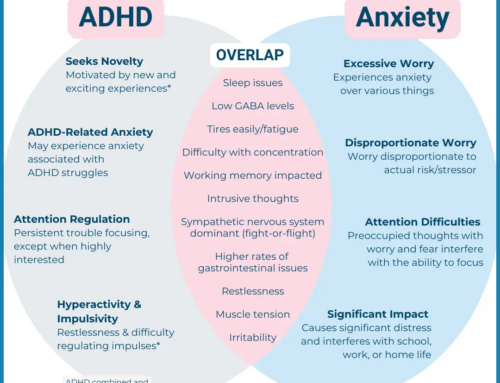Getting quality sleep is crucial for everyone, so make it a goal for 2024. Why?
Just like eating nutritious food, drinking water, and moving your body regularly, sleep plays a vital role in mental and physical health and well-being.
Sleep is named as one of the most important factors increasing emotional regulation, metacognition, cognitive flexibility, maintaining focus, and managing energy, the executive function skills you use to navigate your day. Furthermore, sleep experts agree that there are numerous benefits to consistently getting a full night’s rest.
We’ll share our top EIGHT benefits of sleep with you.
Which ones resonate the most with you personally? Use them to create your vision, goals, and plan for an improved sleep schedule in 2024!
A good night’s sleep positively impacts your mood and your mindset. Mindset is one of the most important foundations for your success. When you are well-rested, you can better moderate your response when things don’t go as planned. Sleep restores the body, improves energy levels. While you are sleeping, your brain actually rids itself of both unnecessary information and toxic chemicals, which is one of the reasons you wake up refreshed.
On the other hand, inadequate sleep increases the risk of experiencing fatigue mental distress. Have you ever felt do tired that you felt sick? Now you know why! Chronic lack of sleep can lead to anxiety, depression, and irritability. Establishing a consistent sleep routine of 7-9 hours nightly can help prevent and reset these symptoms and promote a more positive, success-oriented mindset.
Adequate sleep plays a crucial role in
managing stress. Waking up refreshed helps reduce the stressors that come with functioning while sleep-deprived, such as poor performance, difficulty thinking clearly, and lack of energy. Quality sleep can also help to alleviate anxiety, depression, and other mental health strains associated with stress. Prioritizing sleep is a powerful tool for stress management because your body has a chance to reset at the chemical level. When you get a good night’s rest, your body naturally reduces the levels of cortisol and other stress hormones. Lack of sleep increases levels of adrenaline and cortisol, making us feel wired, edgy and stressed. Well-rested people have been shown to stay calmer and react less strongly to negative situations the day after a good night’s sleep – the key to emotional regulation!
Sleep enhances memory and
cognitive thinking in addition to improving mood and mindset. While you are sleeping, the brain grows, reorganizes information, and forms new neural connections. These connections help us learn new information and consolidate memories. This is why reviewing your notes before bed can be an excellent way to study smarter! A good night’s sleep can also lead to better problem-solving and decision-making skills, as a result of improved cognitive flexibility and perseverance. On the other hand, a lack of sleep can impair clear thinking, memory formation, learning abilities, and overall cognitive function. Even just a week of insufficient sleep can slow down your ability to think quickly and decrease accuracy on tasks. It is especially important for individuals with executive functioning deficits to maintain consistent sleep schedules. There are apps you can use to help guide you to a successful evening and morning sleep routine.
Sleep is essential for the restoration and repair of the body, which probably makes sense given all of the positive benefits we have already discussed. Sleep aids in the production of growth hormones necessary for development in children and adolescents, as well as the repair of tissues and cells in individuals of all ages. Sleep also promotes the production of cytokines, which support the immune system in fighting infections. Inadequate sleep weakens the body’s immune response, making individuals more susceptible to common infections. Chronic sleep loss increases the risk of immunodeficiency. Have you ever stayed up late over a weekend of camp or an action-packed vacation, only to get sick when you returned home?
Lack of sleep was most likely a factor. There are times when you can’t avoid getting less sleep than usual, but if you realize when this is happening, you can make sure to schedule time to rest, take your vitamins, and eat healthy to give your body resilience in fighting infections.
Did you know that quality sleep is essential for your
heart’s health? If you are young, you probably haven’t thought much about heart health yet, but it is never too early to understand more about it. During sleep, the heart rate slows down, and blood pressure decreases, allowing the heart and vascular system to rest. However, insufficient sleep is a risk factor for unwanted cardiovascular events. Lack of sleep causes blood pressure to remain high for an extended period, stressing your system and increasing the potential risk of heart disease, heart attack, and heart failure. Maybe you’ve talked with a parent, relative, or friend whose doctor has told them to concentrate on balancing work and personal life to get more sleep? This is part of the reason why balance is so important. Prioritizing sleep is a proactive way to take care of your heart, and you can start today to make it happen.
Sleep also plays a crucial role in regulating
blood sugar levels. Isn’t it amazing that your body has created these fantastic routines to restore itself? Sometimes you have to push through to finish an assignment, lead a project, or you stay up late to hang out with a friend. But “too much of a good thing” affects the body’s relationship with insulin, a hormone that helps glucose enter the cells for energy. Ensuring you get seven hours or more of sleep each night helps maintain balanced blood sugar levels. Adults who consistently get less than seven hours of sleep are at increased risk for Type 2 diabetes. Insufficient sleep leads to increased insulin resistance, resulting in elevated blood sugar levels.
For students involved in athletic activities, sleep is a key element of recovery and performance enhancement. The body produces the highest levels of growth hormones during sleep, which are essential for tissue repair and muscle growth. Most athletes require a minimum of eight hours of sleep each night to optimize restoration and avoid overtraining. Insufficient sleep can lead to decreased performance, fatigue, mood changes, and an increased risk of injury. It becomes even more crucial to prioritize sleep when training intensity increases.
Both increased quantity and quality of sleep helps athletes improve performance in many areas related to the demands of the sport.
- A Stanford study of men’s basketball players who extended their sleep to 10 hours a night found several positive outcomes. The players ran faster in both half-court and full-court sprints. Their shooting improved by at least 9% for both free throws and three-point shots. The athletes also reported improved physical and mental well-being.
- Male and female swimmers who extended their sleep to 10 hours also saw many performance improvements. Reaction times off diving blocks were faster, turn times were improved, and kick strokes increased. Times swimming a 15-meter sprint also improved. Additionally, these athletes experienced improved mood and decreased daytime sleepiness and fatigue.
- Varsity tennis players, male and female, who increased their sleep to at least nine hours a week also performed better. The accuracy of the players’ serves increased significantly from about 36% to nearly 42%. The players experienced less sleepiness as well.
8. Healthy Weight Goals
Quality sleep, coupled with exercise, stress management, and healthy eating choices, is instrumental in maintaining a healthy weight. During sleep, the body naturally regulates appetite by producing more of an appetite suppressor called leptin, while reducing the production of the appetite stimulant ghrelin. However, on nights with insufficient sleep, the production of ghrelin increases, leading to greater feelings of hunger. Prioritizing sleep can help regulate appetite and contribute to healthy weight management.
We hope this list reminds you that sleep is not just some fancy luxury; it’s an absolute must for your overall health and well-being. Seriously, it’s a game-changer! When we truly understand and prioritize the importance of getting good quality sleep, great things happen. Parents and students alike can unlock the key to leading happier, healthier, and more successful lives. Can you feel the excitement building up?
So, why not make sleep a top priority in your 2024 daily routine? Trust me, you’ll be amazed at the incredible benefits it offers. We’re talking improved brain power, a stronger immune system, increased productivity, and better emotional balance. It’s like a magic potion for your wellness and one of the SIMPLEST ways to make big change. So, take up the challenge to take charge of your life.
Commit to giving sleep the love and attention it deserves, and get ready to experience a whole new level of awesomeness. Let’s do this! Is sleep part of your plan for a NEW path to success in 2024? Join us in the Next 30 Power Planning Course for students to set your intentions and keep them!







